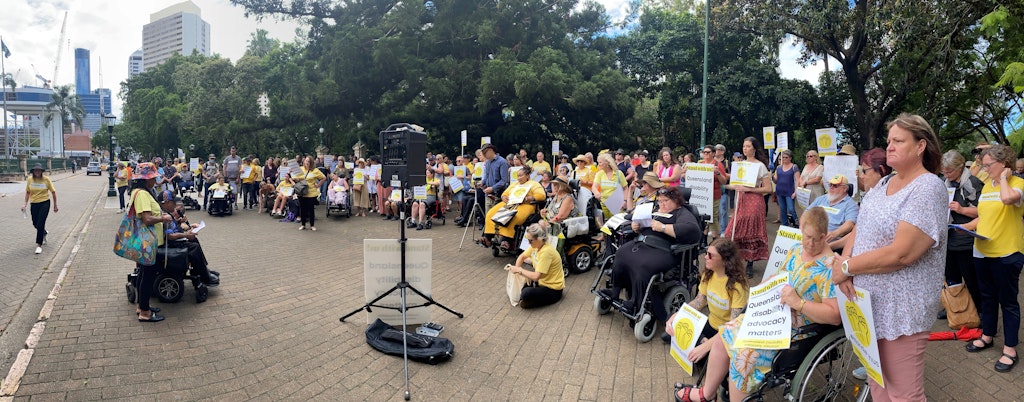QLD Government makes last minute commitment to disability advocacy services
![The Queensland Government announced last minute funding for State disability advocacy services. [Source: iStock]](https://agedcareguide-assets.imgix.net/news/articles/news/articles/Commitment-to-Dis-Advocacy-24_3_2021.jpg?fm=pjpg)
The Queensland Government released a last minute funding commitment last week, ahead of a rally planned for Wednesday 24th March organised by the Queensland Disability Advocacy Alliance outside Parliament House in Brisbane.
Advocacy organisations were campaigning for awareness about the importance of disability advocacy services in the State and demanding a commitment of funding from the QLD Government, as the current $4.9 million will be ceasing on 30 June 2021.
The Queensland Disability Advocacy Alliance (QDAA) created the ‘Stand With Us!’ campaign, since they were concerned that if no funding was to be approved then some disability advocacy services in the State would have to close their doors.
Queensland Minister for Seniors and Disability Services, Craig Crawford, made the funding announcement late afternoon on Tuesday. He says the State Government is committed to working to ensure that all Queenslanders with disability, no matter where they live, have access to the support they deserve.
Previously, the State Government provided non-recurrent funding of $9.2 million to support disability advocacy services over two years from 2019-20 to 2020-21, as Queensland transitioned to the full National Disability Insurance Scheme (NDIS).
“A key priority for the [State] Government is building inclusive communities for all ages, abilities and backgrounds,” says Minister Crawford.
“I am therefore pleased to advise that the Queensland Government is supportive of extending the base funding for disability advocacy services by a further two years to support the sector.
“I acknowledge that demand for advocacy services has persisted despite Queensland’s transition to the NDIS. The NDIS has in fact been a major driver of advocacy demand. Advocacy is a vital support for people, including people with disability.
Minister Crawford highlighted that he met with representatives from the Combined Advocacy Groups of Queensland to discuss Queensland disability advocacy needs on 25 February.
He adds that he is looking forward to a new National Disability Strategy that is being released later this year, which will inform the State Government’s own revised State disability plan.
“Commonwealth action on the findings and recommendations of the various reviews of the NDIS is in the early stages, meaning the underpinning systemic issues, including disability advocacy, are yet to be addressed and will likely take a significant period of time to fully resolve,” explains Minister Crawford.
“We will be extending our support through our existing arrangements while we also work with the Federal Government, who is leading a demand and gap analysis of independent disability advocacy and decision-making supports.
“Findings of this work will strongly inform discussions on future arrangements for funding.”
The Queensland Disability Advocacy Alliance has welcomed the announcement from the State Government, which is a funding commitment of base funding at $8.1 million over the next two years for continued advocacy services in Queensland.
They believe the announcement should give people with disability and their families assurance that they will still be able to access vital advocacy services after 30 June 2021.
Chief Executive Officer of Aged and Disability Advocacy Australia (ADA Australia), Geoff Rowe, did highlight that the fundings is about $500,000 less per annum compared to previous funding, and that the QDAA are still trying to unpack everything from the announcement due to the unexpected and sudden funding commitment.
Mr Rowe adds that people with disability have been heard, but there is more work to do.
“Through the Stand With Us! campaign, Queensland Government has heard directly from people with disability that access to advocacy is very important in their lives, and they have listened,” says Mr Rowe.
“However, the need for advocacy support is ongoing and people with disability and their families need certainty that advocacy supports will be available to them in the future.”
QDAA intends to continue working with the State Government so that continuity and certainty of services remain for Queenslanders with disability and their families.
Over 170 people with disability rallied in Brisbane and Rockhampton on 24 March to raise their concerns about the future of funding for disability advocacy, as part of the Stand With Us! campaign.

Spokesperson for the Stand With Us! campaign, Des Ryan, said the rally turnout shows just how much disability advocacy matters to people with disability.
“Advocacy helps people with disability right across Queensland, including in regional areas, when they’re most in need of help. Help that is not available through any other avenue,” says Mr Ryan.
Minister Crawford attended the rally and reaffirmed Queensland Government support for disability advocacy, but acknowledged to QDAA that the two-year funding commitment is a stop-gap measure while an ongoing model for advocacy is developed between the State and Federal Government.
Geoff Rowe said that work towards an ongoing disability advocacy funding model is paramount, and that the NDIS is only one part of the picture.
“The two-year funding commitment is a great start, and the Alliance looks forward to working with Government to help develop a sustainable and fair funding model that provides advocacy support for all Queenslanders with disability, not just those who are participants in the NDIS,” says Mr Rowe.
The Alliance will work with Queensland Government on processes to allocate the $8.1 million and continue to provide disability advocacy support where it’s needed.
Minister Crawford highlighted his wish to continue working with QDAA and other disability advocacy groups into the future to assist with supporting the special needs of particularly vulnerable groups of Queenslanders with a disability.